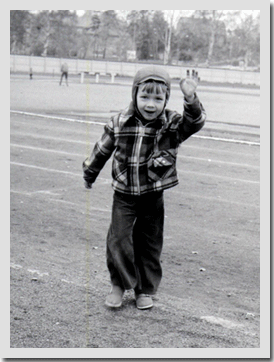As I write this, I also have three chat windows open on my screen. One, opened this morning, five hours ago, is a MSN window to Wife, who’s sitting at her office. Another one is a Skype window to a buddy in Vienna, Austria, and a Canadian friend just popped up in a Facebook chat window. With the exception of Wife, a chat window is often my preferred method of communication.
It’s nothing personal – naturally, since I am, indeed, chatting with some of my friends throughout the entire day – it’s just that this way we cover a lot of topics and yet, each one of us is free to do other things as well.

I just like to write. If I’m given a choice between calling a customer service about a dish washer and emailing them about it, I will email them nine times out of ten – the tenth time being today when Wife asked me to make a call, wrote a note with the phone number on it, left it on my laptop, and asked me if I had called them in a chat window just now.
Of course, I have to speak in semi-public, too. For example, I have to conduct interviews over the phone, but every time, sometime during the call I fade out and forget to listen what the other person is saying, as I try to imagine what something I just said had sounded like.
A part of that is the language. My voice is different in different languages, Finnish being the lowest and Swedish the highest, with English somewhere in the middle, closer to Finnish. That is also how the the respective cultures rank in machoism.
I also speak too fast and even at my current speed, my mouth is two steps behind my brain. So this is what it sounds like when I say my name: “Ristpkrnn!
And I can’t speak slower, because then I forget what I was about to say.
So I mumble.
But it’s got better over the years. When I was seven, I rolled my r’s like a Frenchman, and lisped my s’s like a Spaniard. Not a great thing when your name is Risto – and when you pick up the phone and say, “Ristpkrnn”!”
However, in my family, especially the r’s were considered just cute. It was that “r” that made my “Jokerrrriiiiiit” cheer so funny. It was that rrrrr that really stuck with Grandma when I said I would “guarrrrrrrd” her cashbox.
Mom and Dad told me often not to worry about the r, because one day I’d probably be great at French. (Not a word about Spanish, though). In high school, I would entertain girls by picking up a French magazine and reading it out loud to them, then “translating” the story for them. They didn’t think it was as funny when they found out I couldn’t really speak French.
The family legend was strong, though, so strong that when I finally did take up French in the university, as a 20-year-old, I was so confident that I would learn it perfectly just like that, that I chose a class that started at 8.30 am on Tuesdays and Thursdays, then missed half the classes sleeping in – and still thought I’d be able to pull it off.
Bon chance. No chance.
Now, I don’t even know what the policy is these days, but back then, what I had was a speech impediment that had to be fixed. I was orally handicapped and so once, maybe twice a week, I had an appointment – during school – with a speech therapist.
We began with the s, because she said it was the easier one, gently preparing me for a long relationship. We’d try different sounds, we’d do the soft th of “the”, and the airy one of the th in “thought”, and we buzzed like the bees, and we made faces. I say “we” but I did most of the work with trying to keep that tongue behind them teeth. So I’d do it again, and again, and again.
I have no idea how long I had to go see her, but I know I didn’t think it was fun. Especially when you had to leave the classroom in the middle of a class so everybody would look at you, and each other, and nod. It wasn’t fun even after I graduated to the r, and to the “drn-drn-drn’s” and the “grr-grr-grr’s”.
But it was fun when it was over, and I’m sure those early drills have helped me get some of the English and Swedish pronunciations right.
Sometimes, when I’m by myself, I hold imaginary conversations in fake French – because it’s the only kind I know how to speak – and I think I sound pretty good.
But if I really want to get a message across, I’ll send an email. In English.

Never could get my "r" to roll in Spanish. Unfortunately, Donde esta el perro sounded more like Donde esta el pero. Hmm…and do I really care where someone’s "but" is???